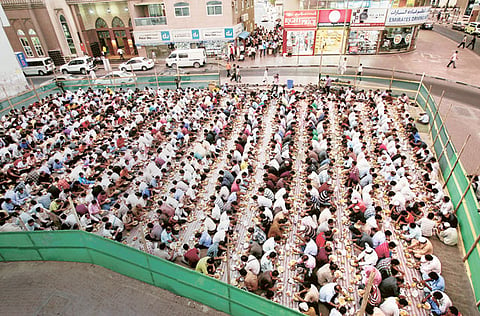Fasting cuts heart attack risk: Dubai study
Pioneering Dubai study sheds new light on the science of fasting during Ramadan

Dubai: People who fast during Ramadan are doing themselves a big favour healthwise as fasting reduces the risk of heart attack, a pioneering Dubai study has shown.
The study, conducted on 37 volunteers who agreed to have their blood samples taken on three different occasions during Ramadan last year, showed a 15-per cent average drop in triglycerides (TG) levels and 10.9 per cent drop in low-density lipoprotein cholesterol (LDL), two of the main risk factors for heart attack.
Dr Omar Kamel Hallak, Chief of the Interventional Cardiology Department at the American Hospital Dubai, who led a five-man research team, said it was the first time such a study showed a consistent link between fasting and lipid profile, he said.
Lipid profile is a collective measure of a person’s total cholesterol, high high-density lipoprotein cholesterol (HDL, or the “good” cholesterol), LDL (the “bad” cholesterol) and TG (triglycerides, a type of fat found in the blood).
In general, higher HDL cuts the risk of heart disease, while high levels of LDL and triglycerides make people prone to it.
The study also measured other parameters such as body mass index (BMI), blood pressure and glucose. Muslims fit to fast are enjoined to abstain from food for 14 hours from dawn to dusk during Ramadan.
To check the volunteers’ lipid profiles, blood samples were taken in three stages — two weeks prior to Ramadan, three weeks into Ramadan and two weeks after the month ended. Three weeks into Ramadan, the volunteers’ TG levels slid by 15.5 per cent to an average of 161.89 mg/dl from 191.6 mg/dl taken two weeks prior to starting of fast.
Meanwhile, the average level of HDL, or the “good cholesterol”, among the volunteers spiked by 11 per cent from 37.1 mg/dl to 41.19 mg/dl three weeks into the fasting month. “The study has consistently shown an average rise in good cholesterol (HDL), whereas LDL and triglycerides decreased. This reduces the risk of suffering from a heart disease,” Dr Hallak told XPRESS.
Several smaller studies (15 or more respondents) were done in the past, but the results were inconsistent, said Dr Hallak, a board member of Emirates Cardiac Society. The US-trained specialist presented his findings at the World Congress of Cardiology April 2012, and recently published it in the Journal of the American Heart Association.
Stroke risk reduction
Dr Hallak’s study follows a recent study by the National Institute on Ageing in Baltimore, US, and published in February, which shows that fasting for regular periods could help protect the brain against degenerative illnesses and diseases such as Alzheimer’s and Parkinson’s.
At least eight other researches have studied the effects of fasting to humans — in Algeria, Europe, Kuwait, Singapore, Saudi Arabia and Tunisia. None of them, however, showed its direct effect on lipids. Interestingly, the body mass index of Dr Hallak’s volunteers increased from an average of 26.6 before Ramadan to 29.97 three weeks into Ramadan.
BMI is an indicator (but not a direct measure) of a person’s total body fat. A BMI between 25 and 29.9 is considered overweight. In the study, changes in glucose and blood pressure levels were insignificant.
Proof of concept
Dr Azzan Bin Braik, a consultant at Rashid Hospital and the UAE’s leading cardiologist, said that the study is a “proof-of-concept … it tells you there’s something there, that those who fast during Ramadan may derive some benefits from it”.
Asked, however, why the volunteers’ average BMI spiked by 12 per cent three weeks into the fasting month, Dr Bin Braik said: “This is difficult to explain… you need to look closely into the diet of the volunteers in any such study.”
While it is unlikely for a person’s lipid profile to change dramatically within three weeks of daily 14-hour fasting, he said the study may be a significant first step because at 41 per cent, the incidence of hypertension in the UAE is higher than the world average.
“Many people do change their diet during Ramadan. Those who fast during Ramadan either lose weight or gain weight.”
Dr Bin Braik said a wider study with hundreds of volunteers is needed to establish a “robust” link between Ramadan fasting, diet and heart disease.
The ideal iftar to end fast
The body’s immediate need at iftar is an easily-available energy source in the form of glucose for every living cell, particularly the brain and nerve cells, said Safeek Ali, dietician at Welcare Hospital.
“Dates and juices are good sources of sugars and help to gain quick energy,” he said. “Intake of fluids in the form of juice and soup helps maintain water and mineral balance in the body.” He warned that too many servings of fried foods and sweets with added sugar are very unhealthy.
A typical iftar can be three dates, one cup of fruit juice, and one cup of vegetable/chicken soup, two plain graham crackers or a small portion of low-fat sandwich. “It is always better to have a light Iftar with plenty of fluids to rehydrate your body and then have a moderate dinner. Including bread or carbohydrate-rich food during iftar is not a bad option as the body needs quick energy at that time. Over-eating may lead to bloating and indigestion.”



